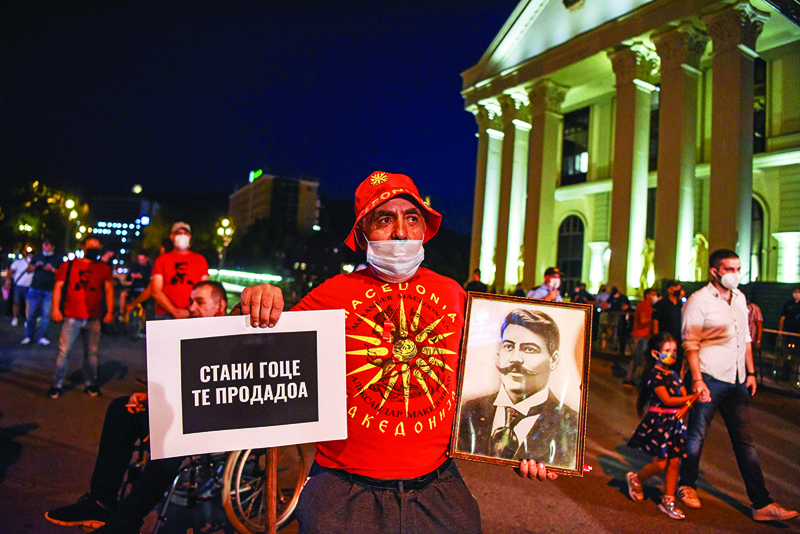
SKOPJE: After changing its name last year to settle a decades-old battle with Greece, the small Balkan state of North Macedonia was finally on a path to join the European Union. Until Bulgaria stepped in. Another neighborly row is now encroaching on Skopje's dream once again as Bulgaria rekindles tussles around history, identity and language that have haunted North Macedonia since its birth 30 years ago, threatening to veto the start of the EU accession process.
For the poor, land-locked country home to some two million people, the return of historical bickering at a time when most want to focus on the future is exhausting. "It certainly feels like we're going down the same road again," lamented Bojan Dimevski, a 30-year-old consultant in Skopje, the capital of North Macedonia. "In the 21st century, when globalization is the main engine, we are discussing which nation, language or history originates from which," instead of "celebrating the things that unite us".
For decades, Greece blocked Skopje's entry to NATO and the EU in protest over its former name Macedonia, which it viewed as an encroachment on its heritage and a province that bears the same name. Athens finally relented after Skopje agreed to add the qualifier "North" last year, a move that was hugely unpopular but lifted the blockade. Now, Bulgaria has made a number of demands before it will give the okay to the EU accession talks, like avoiding any mention of a "Macedonian language", which it considers a Bulgarian dialect.
Changing frontiers
While the disagreements may be baffling to outsiders, notions of nationality are heavily fraught in a region that has seen centuries of shifting frontiers and power centers. Newer surges of nationalism have helped fan the flames. Much of the trouble lies in the fact that the country is part of a broader geographical region known as Macedonia that historically spanned parts of present-day Bulgaria and Greece.
Sofia considers Macedonians to be Bulgarians who were merely persuaded to believe in a separate identity under an "ethnic engineering project" that took place in the mid-20th Century when the territory was a republic in communist Yugoslavia. The Macedonian language is a similarly false construct, argues Sofia, which is demanding EU documents refer to the "official language of the Republic of North Macedonia".
Travelling down the annals of history, the disputes get even thornier. A commission of experts from both countries has been trying to work out various debates and harmonize school textbooks. They had some successes, agreeing on recommendations that covered history books until the 6th grade. But the meetings broke down last year when they reached the 7th grade and the Ottoman-era hero Goce Delchev appeared, according to Petar Todorov, a history professor in North Macedonia on the commission.
Contested hero
Born in present-day Greece while the region was under Ottoman rule, Delchev taught at a Bulgarian school in what today is North Macedonia. He made his name as a revolutionary leader struggling against the Ottomans at the turn of the 20th century. Both Bulgaria and North Macedonia now claim him as their own, with cities, statues, schools and universities named in his honor.
In Bulgaria's southwest city of Gotse Delchev, which uses a different English spelling, nobody doubts his origins. "The people here are adamant: Gotse Delchev is a Bulgarian historical personality," high school director Elka Bojikova told AFP. Across the border at the Skopje church where Delchev's remains lie, the view is reversed. "I can say what every Macedonian would say. Of course Goce Delchev is ours," said a Skopje resident who declined to give his name.
'Artificial nations'
Germany has been trying to broker an agreement in recent days to walk back Bulgaria's threat to veto Skopje's accession bid. In the meantime, some independent historians argue the commission's framework for ironing out these differences is misguided. "It's near impossible to arrive at a single story about the past," Dimitar Bechev, a Southeast Europe expert at the Vienna-based Institute for Human Sciences, told AFP.
He and other academics from both countries warned against "outdated and very restrictive conceptions of national identity as something eternal and immutable". "All nations are constructed and even literally 'artificial'", they wrote in an open letter.
Analysts also point the finger at Sofia for an all-too-familiar playbook in the Balkan region: Reviving emotive historical conflicts to win points ahead of elections, which are set in Bulgaria for next year. Furthermore, Skopje is especially vulnerable now with EU accession dangling in its future, said Bechev. "The opening of membership talks is usually the point when a EU candidate is likely to make most concessions." - AFP









